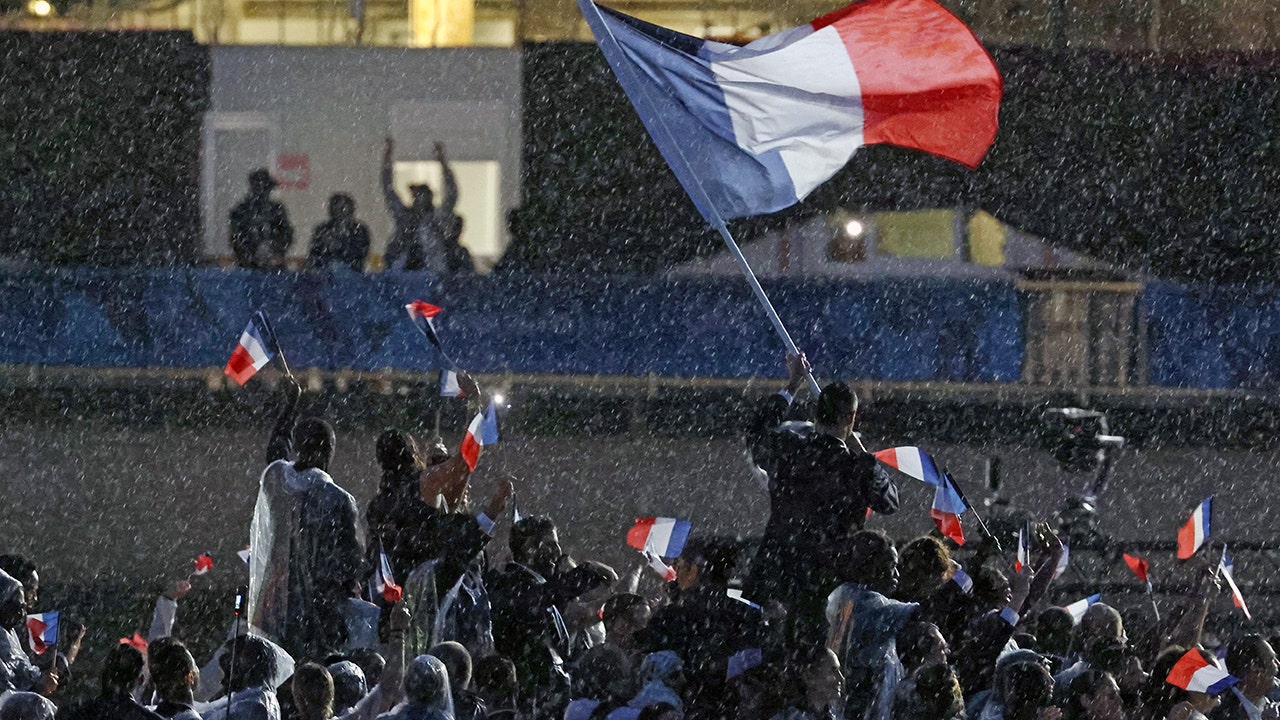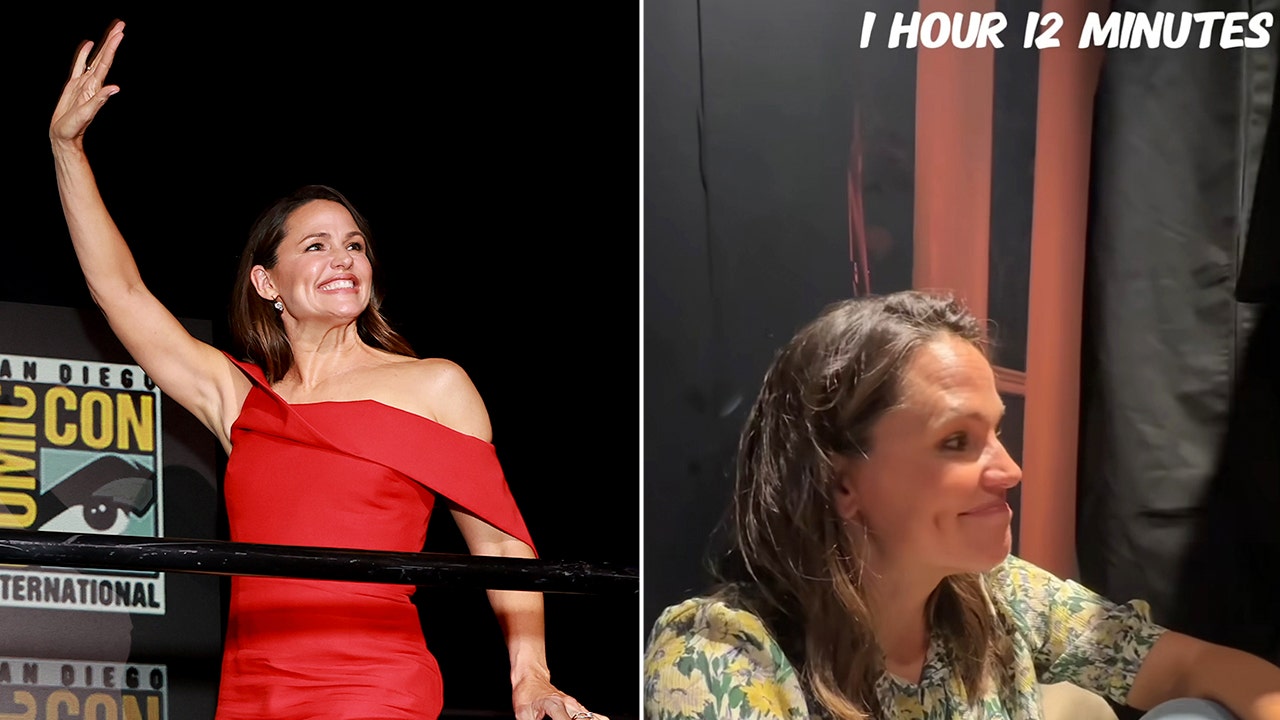
ESPN staffJul 27, 2024, 08:01 AM ET
The Olympics are officially underway after a memorable opening ceremony Friday in Paris.
Saturday's events will be headlined by gymnastics, swimming, beach volleyball and tennis. Men's basketball will also begin, though Team USA doesn't compete until Sunday.
Katie Ledecky's quest for her 11th Olympic gold medal begins Saturday in the 400m freestyle, where she will compete against Australian rival Ariarne Titmus, the reigning gold medalist. Carlos Alcaraz and Rafael Nadal begin their doubles journey at Roland Garros, while Coco Gauff and Jessica Pegula will do the same on the women's side.
Team USA battling illness ahead of men's basketball opener
Team USA boasts a stacked men's basketball roster, but the squad hasn't been at full strength as it prepares for its opening game Sunday against Nikola Jokic and Serbia. Both Joel Embiid and Anthony Davis have missed time over the past few days with an undisclosed illness, according to coach Steve Kerr. Kerr says, however, that he's 'confident' the full roster will be ready for Sunday's game.
Cyclists critique venue
Cycling trials began Saturday, but the results weren't the only thing from the event that generated buzz. A number of competitors offered criticism of the respective venues for both cycling and mountain biking. Belgian cyclist Remco Evenepoel noted that while the Parisian view was beautiful, stretches of road left something to be desired in terms of quality, while Team Switzerland's Nino Schurter noted that the man-made nature of the mountain biking paths created a slippery side.
Swimming gets underway
Olympic swimming officially got underway at La Defense Arena with six preliminary events. There was a large -- and very spirited -- crowd on hand complete with air horns, drums, flags and even an inflatable kangaroo.
Perhaps no event got the fans more fired up than the qualifying heats for the women's 400m freestyle -- and specifically the final heat that featured American Katie Ledecky, the 2016 gold medalist in the race and the Olympic record holder, and her Australian rival Ariarne Titmus, the 2020 champion and current world record holder. Titmus led for most of the race before Ledecky picked up the pace in the final 100 meters and overcame her.
— NBC Olympics & Paralympics (@NBCOlympics) July 27, 2024New Zealand's Erika Fairweather and Canada's Summer McIntosh -- the other two favorites to medal in Saturday night's final -- competed in the second heat and qualified in third and fourth, respectively. Safe to say, this race is already living up to the hype and tonight could be epic. Was Titmus just preserving herself for the final? Will Ledecky be able to find that other gear again when the stakes are highest? We'll find out soon enough.
In the men's 400m freestyle, Lukas Maertens of Germany recorded the best qualifying time (3:44.13). Aaron Shackell was the lone American to qualify for Saturday night's final with the sixth-fastest time of the morning.
The women's 100m butterfly heats kicked off the action with Yufei Zhang of China notching the fastest time (56.50). Americans Torri Huske (56.72) and Gretchen Walsh (56.75), who earned the world record at trials last month, qualified for the semifinals with the third- and fourth-best times.
Saturday morning closed out with the qualifying races for both the women's and men's 4x100m freestyle and both events had the fans on their feet throughout. The American women (which included the resurgent Simone Manuel in the second leg) easily won their heat with a 3:33.29 finish -- 2.84 seconds better than second-place Great Britain. However, it was Australia, competing in the second heat, that recorded the best time (3:31.57) ahead of Saturday night's final, setting up yet another clash between the two countries with a gold medal on the line.
The American men (3:12.61) finished second in their heat behind -- you guessed it -- Australia and had the fourth-best qualifying time overall. China (3:11.62) recorded the best time of the morning and will be in the coveted fourth lane in the final.
Saturday's evening session gets underway at 8:30 p.m. local time/2:30 p.m. ET. -- D'Arcy Maine
First medals of the Games are confirmed
— On Her Turf (@OnHerTurf) July 27, 2024It didn't take long for the first Olympic hardware to be awarded. Kazakhstan earned bronze in the mixed air rifle final just after 5 a.m. ET, making it the first team to medal in Paris. In that same event, China and South Korea won the first gold and silver medals of the Games, respectively. Team USA captured its first medal later in the morning when Sarah Bacon and Kassidy Cook took silver in women's synchronized 3m springboard.
Top events to watch
5 a.m. ET: Gymnastics -- men's qualification: subdivision 1 floor, parallel bars, pommel horse, rings, vault
5 a.m. ET: Swimming -- men's/women's 100m breaststroke, men's/women's 400m freestyle and men's/women's 4x1000m freestyle relay heats
6 a.m. ET: Tennis -- women's singles Round 1
8 a.m. ET: Beach volleyball -- Team USA men's matchup against Cuba
2:30 p.m. ET: Swimming -- men's/women's 100m breaststroke semifinals plus medal rounds for men's/women's 400m freestyle and men's/women's 4x100m freestyle relay
A full list of the July 27th schedule can be found here.
Here's what's in store for Saturday:

Suboptimal weather
After a rainy opening ceremony, conditions in Paris haven't improved much entering the Games' first official day of competition. Saturday's forecast calls for rain throughout the day, affecting the event schedule. Men's street skateboarding, deemed too unsafe to compete in during Saturday's rain, has been pushed back two days to July 29.
New technology
Just how high does Simone Biles fly on her triple-double tumbling pass?
After her performance on the floor at the Olympic trials in Minneapolis last month, "SportsCenter" attempted to find out with a post on Instagram. The graphic measured the top of Biles' head where it was 12 feet from the ground, providing enough room for 7-foot-4 NBA center Victor Wembanyama to fit beneath her.
There were no measuring devices at the Target Center during trials, so ESPN's measurement served as an approximation based on a photo.
In Paris, fans will learn exactly how high Biles flies.
Omega, the official timekeeper of the Olympic Games, is debuting new technology across sports that uses cameras with motion, positioning sensors and AI to capture the biomechanical movement of athletes. It will also display precise measurements like height, reaction time and airtime.
"In tennis, we'll finally be able to see if reaction times have an influence on the quality of returns," says Alain Zobrist, CEO of Omega Timing.
For sports with a finish line like track and field, Zobrist says upgraded photo finish cameras will capture 40,000 photos per second and deliver immediate results.
In gymnastics, the tech will be utilized during men's and women's competitions for storytelling purposes in live broadcasts and to aid head judges when there are discrepancies. While this technology was not used to create the SportsCenter post from trials, that is precisely the type of content Zobrist says can be generated during meets.
The cameras and sensors will be positioned only around the floor exercise and the data that's generated in real time -- such as height and airtime of skills -- will be provided to television broadcast crews. More sophisticated data that takes a few seconds to generate -- like body positioning throughout a pass -- will be provided to head judges, as well as to athletes, their coaches and delegations for training purposes.
Zobrist says the tech has been tested at local and international meets for about four years to ensure judges were comfortable with them before the Paris Games. He also says that while the sensors can detect when an athlete steps out of bounds on a pass, they will not replace humans for this job, for now.
"We are still working strictly according to the rules of the federation and the rules require for judges to be around," Zobrist says.
However, in the future that could change -- for more than just out-of-bounds decisions.
"We are going to see major evolution in the technology for gymnastics in the next couple of years," he says. "It's difficult to say when we will be more accurate than humans to spot differences in the performances of athletes, though. It will be interesting to ask me that question again before the Olympics in Los Angeles [in 2028]. I may have a better answer to give you then." -- Alyssa Roenigk

 German (DE)
German (DE)  English (US)
English (US)  Macedonian (MK)
Macedonian (MK)  1 year ago
381
1 year ago
381







